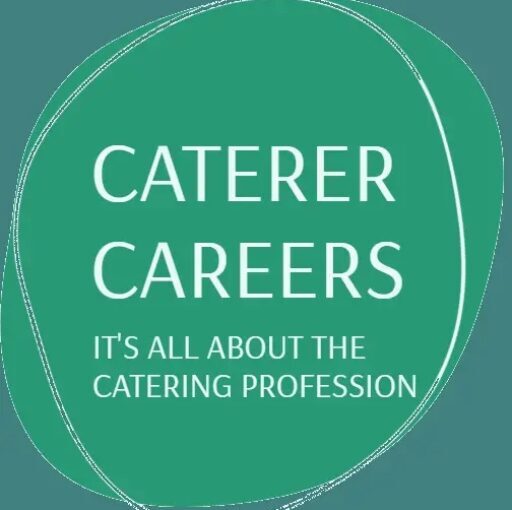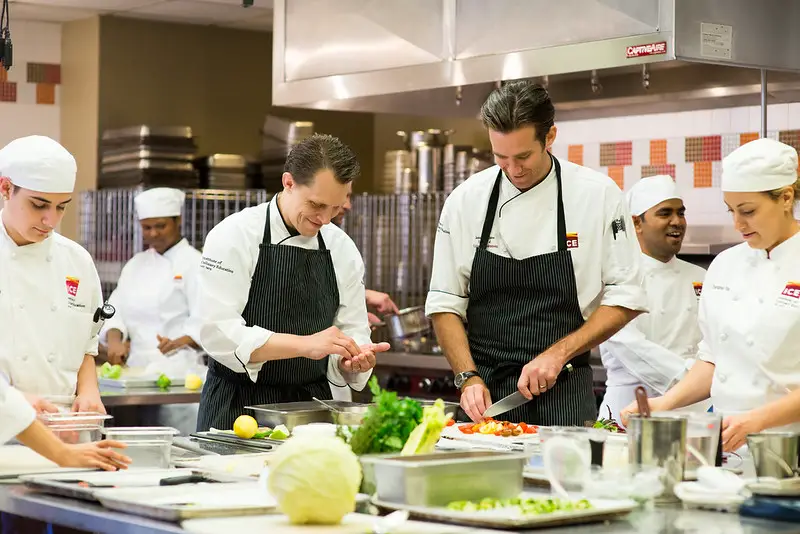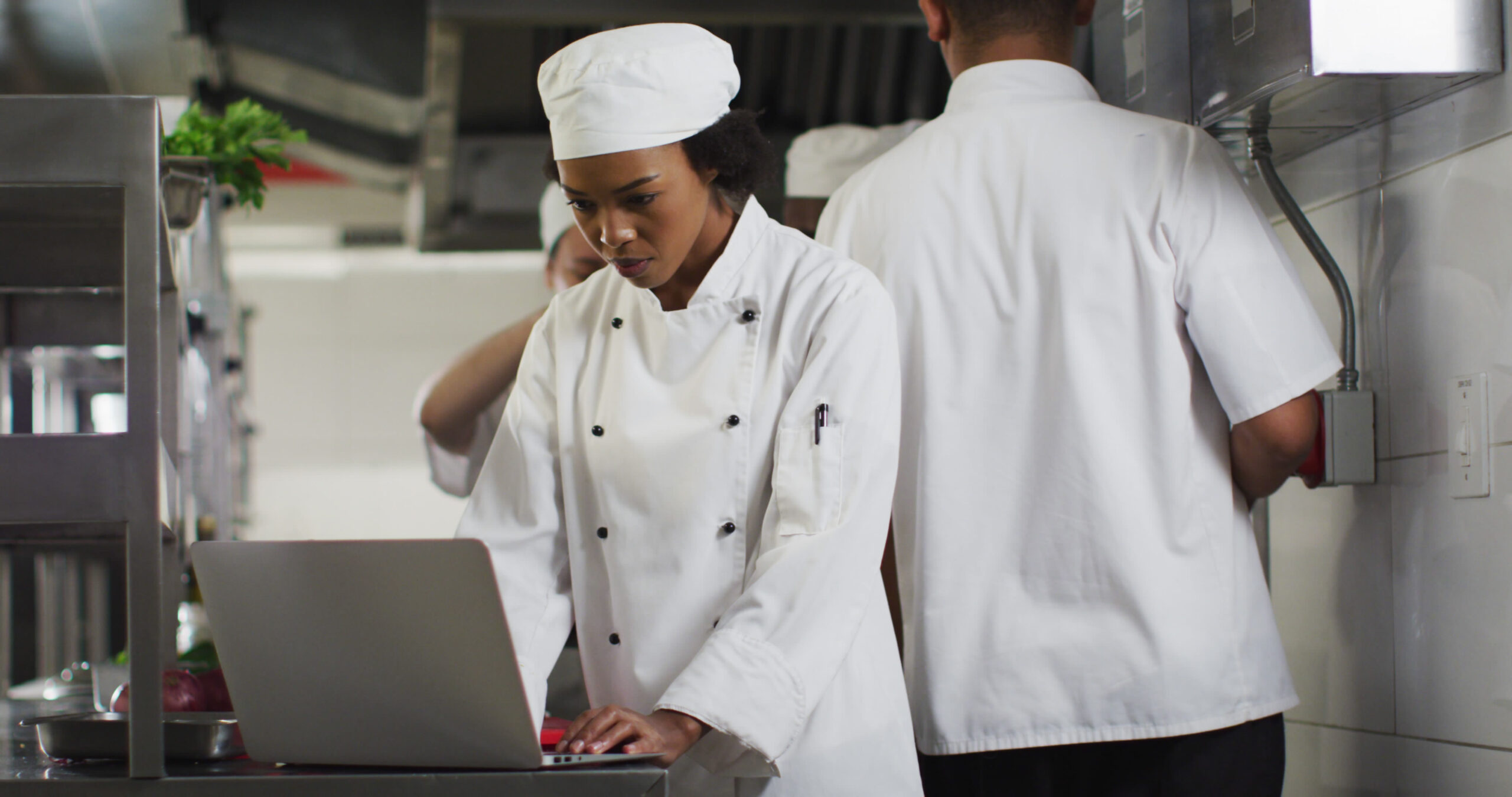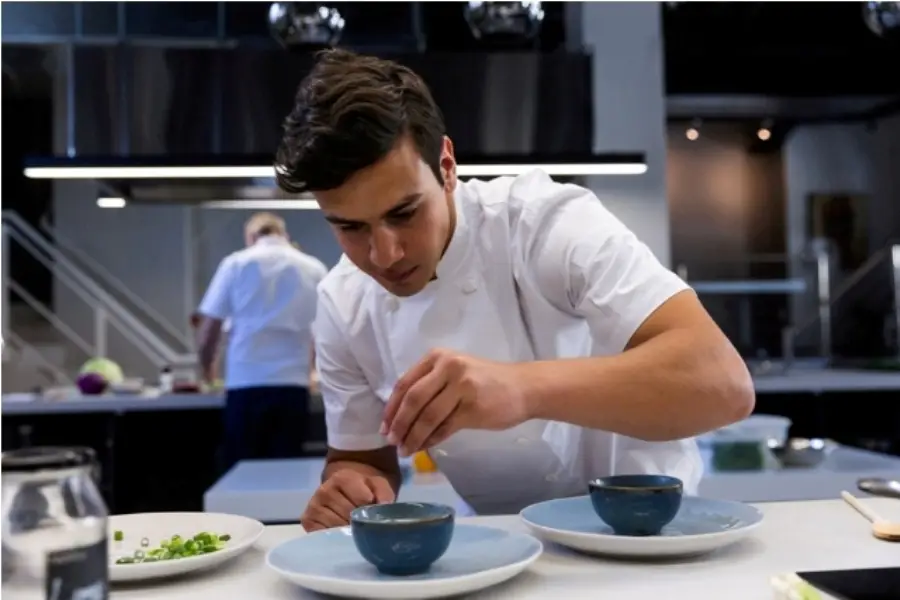
Culinary skill is something that is developed over time.
The knowledge of a chef who has been in the industry for over 10 years, can’t be the same as someone with 2 years experience in the field.
There’s always room for growth and development in the profession.
Experienced caterers can recall their starting before they get to where they are today.
For instance, a chef who has gone through the ranks before becoming an executive chef will have lots of stories to tell.
Practicing an art to become an expert in it — is something worth doing — and can be very rewarding.
We admire chefs, at the helm of affairs of a kitchen, but — do we think through to know what makes them successful in their career?
The number of years that one has attained in an industry can tell the level of experience he/she has.
Sometimes, when chef roles are being advertised, the employer will state the range of experience for the candidate they’re looking for.
Why is it so?
Even when the position of a commis chef is being advertised, the employer will state the range of experience for the candidate they want.
The range of experience speaks of the level of knowledge he/she has attained.
Would-be chefs should pursue an in-depth knowledge of culinary skills if they want to be successful in their career as a caterer.
Knowledge is gained on a day-to-day basis through practice which leads to being a competent career person.
Below are points that make a chef experienced:
Organization: Organizing work is one vital skill of the experienced chef. If this caterer wants to make a coleslaw salad, for instance, the chef gathers the ingredients for the salad on a work table and gets the salad done immediately. It ensures ingredients for the dish are assembled once, and prepared once.
Timing: Cooking meals in quick shortest time is a skill this chef has mastered. To make mashed potatoes, the potatoes have to be “steamed or boiled”. Peeled-whole potatoes will take a longer time to cook — peeled potatoes, cut in small chunks, will take a shorter time to cook.
Cutting/Chopping: This is one area to know an experienced culinarian, the way he/she works with the knife, shows how experienced they are. Their handling of the knife when chopping, dicing, or cutting vegetables, will require one to pay attention to. Hands-on work in the kitchen will always require the use of a knife. I wonder if there’s any day work in the kitchen without the handling of knives.
Knife Sharpening: A blunt knife can’t deliver on this job. This caterer is skillful in knife sharpening and keeps his/her job on the go.
Skimming: When cooking stew or soup in the pot, and the content is at boiling point, atop the dish is a substance foaming, the skimming out of the foam substance, makes the dish look clean.
Marinating: This’s another point where this chef displays their wealth of experience – marinating meat chunks, seafood, poultry, etc….is another thing to note.
Saucing: Their saucing of cooked items arranged on plate or bain marie, is something to observe.
Filleting/Deboning: If there’s a salmon dish on the menu, and while production is going on, the kitchen happens to run out of ready-made salmon fillets in stock. If there’s whole salmon available, this chef will get to work immediately, filleting the salmon, to show they’ve known the job from scratch. Carcass dissection or butchery is a skill a chef must possess.
Scaling: Measurement of ingredients is sometimes applied to ensure accuracy in culinary work.
Sieving/Straining: You made that sauce, and it came out having lumps, you can fix it by passing it through a fine or conical strainer.
Plating: This is an art this chef is known for, the arrangement and design of food on the plate are spectacular to see.
Gravy: The knowledge of making gravies is another point that shows the experience of this culinarian.
Grilling/Stir Fry: The way this chef handles pan and wok during grilling, will make you know that for sure he/she is an experienced caterer.
Prepping: Planning work in advance is the way this caterer does its task, mise en place for a dish to be prepared should be ready prior to cooking.
Spicing/Seasoning: This is a sensitive area that will determine the outcome and taste of your cooking. The quantity of spice and seasoning you add to your cooking will determine whether the food will be delicious or not. If the taste of the dish will be great or awesome, this is where to prove it. The hands of the experienced chef have mastered the quantifications involved in spice and seasoning.
Poaching: Another skill this culinarian has added to its knowledge is poaching. This chef is skilled in poaching food ingredients.

Materials arranged for baking.
Baking/Pastry: The experienced chef has basic knowledge of dough and pastry work, as much as this is not its specialization, this caterer can display basic knowledge in this area by making dough for dumplings, bread, puff pastry, etc.
Larder Work: This chef seems to be an all-rounder, his/her skills in making salad and cold food will show for it.
Garnishing: This caterer ensures that plated dishes are appealing to the eyes, sprinkling micro herbs, chopped chives, parsley, etc. Says it all.
Cooker/Stove Regulations: This could make or break your cooking. Dishes are cooked at various temperatures. This is one of the most sensitive areas of the job. Heat temperatures are regulated while cooking so dishes could be made as desired. This is another skill of the experienced chef.
Kneading: There’s so much hands-on work in the kitchen. This caterer also has knowledge of dough making.
Whisking: This is another process this caterer uses to get stuff done.
Pickling: This chef always looks for flavors. Pickled food items are an addition of flavors in cooking.
Mashing: Some food items go through this process from the hand of this chef.
Stuffing/Sandwiching: Have you seen a burger or sandwich? This is the creativity of the experienced chef.
Caramelising: The creation of flavours seems to be endless! I guess you might have had a dish flavored with caramelized onions or sugar.
Basting: Roast meat is made glossy by this method.
The Roller-pin: This is another aspect in which this chef demonstrates knowledge of pastry work
Canned-opening: Do you open canned items? This is one of the practices of the profession.
Item/Commodity Storage: Preservation is a skill this culinarian will always foster.
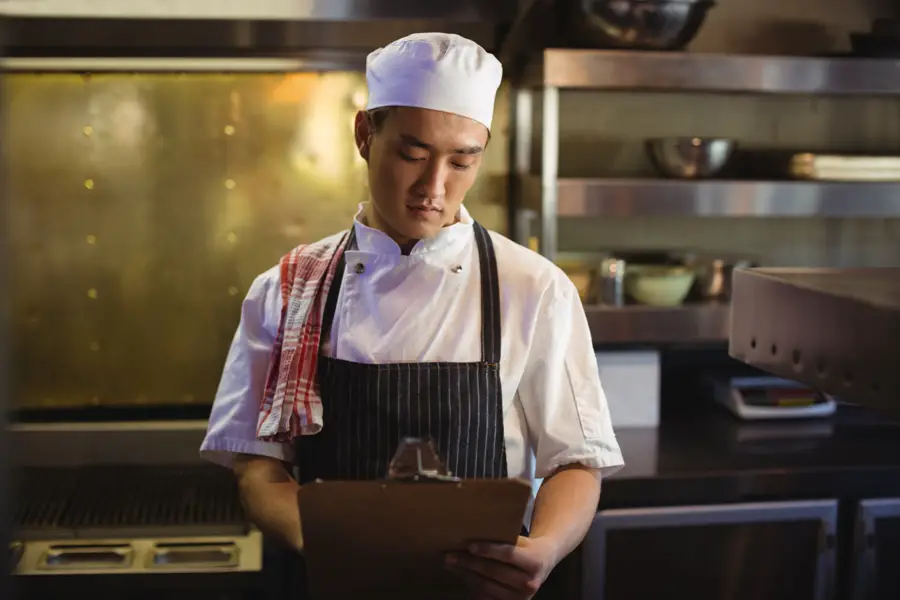
A caterer attending to inventory.
Book-Work: This caterer ensures that materials for culinary work have to be accounted for.
Clean/Personal Hygiene Practice: You need to see the personality of this chef – his/her chef’s white, hat, apron, etc., is always clean.
Cooling/Blast Chilling: The experienced chef ensures that hot food mise en place for later usage undergoes cooling or blast chilling before storage.
Commodity Checks: This is one of the routine jobs of this chef. He/she ensures that items for culinary work are always in good condition.
Peeling: This is a day-to-day experience of this caterer in the kitchen.
Mincing: This process of cutting meats in small bits has added another texture to cooked meat products.
Smokin/Barbecue: This is another method of cooking that produces a unique aroma in food.
Communication: The way this chef relates with team members is awesome!
Mixing: Combinations of food ingredients have produced lots of dishes.
Blending: This has contributed a lot to the preparation of dishes.
Broth/Stock: The base of any soup, sauce, etc., emanates from stocks.
Roux: This caterer possesses the knowledge of thickening agents.
Glazing: Is it by blow lamp or under the salamander, this chef knows the beauty of culinary arts.
Toasting: Do you know how to toast bread? Don’t you? This culinarian will also let you know that bread or nuts can also be toasted on a pan.
Speed: You need to see the movement of this chef within the kitchen! This caterer demonstrates that commercial kitchens are fast-paced environments.
Tossing/Flipping: You need to see the handling of the pan by this chef – this culinarian is a strong hand.
Binding/Trussing: The hands of this caterer are so skillful! This chef maintains the old-fashioned binding or trussing of cut meat by thread.
Flambe: A French word – the flames generated within the pan during grilling — adds a unique flavor to the dish.
Carvery: Have you been in a restaurant where roast meats are set up for diners – the carvery services of this chef are a thing to note.
From-scratch Production: This chef is knowledgeable in the making of schnitzel, mayonnaise, pesto, etc. — from scratch.
Tasting: It’s common knowledge that — anytime we cook — we taste. The attention given to personal or home cooking will reflect as personal or home cooking. In a commercial kitchen, tasting of food during or after cooking is regarded as a skill every professional cook must possess. Chefs spend time tasting dishes to ensure that flavors are balanced.
When they are making recipes, calculations are done so that the proportions of items in the menu are assigned accordingly so flavors can be balanced. Tasting of food is a skill the experienced chef has mastered. When cooking a dish, the chef does the tasting repeatedly. While this chef is making a dish, he/she will ask fellow cooks to have a taste of the food, just to ensure good cooking.
Soup/Sauce Consistency: Do you like soups? Do you enjoy sauces? This chef is conversant with soup and sauce consistency.
Residual Cooking: If you have lots of cooking and it’s urgent, or you are in a hurry to meet up. For instance, if verges are part of the items you are to cook. You can steam the verges for a few minutes, strain out the water, and return the verges into the pot with the lid on it (the pot), the leftover heat within the pot will cook the vegetables properly before you finish cooking other items. This is one of the skills of an experienced chef.
Piping: Culinary arts is awesome! This is another aspect of this chef demonstrating artistry in food work.
Blanching: Hot water in a pot below boiling point, can be used to pre-cook vegetables, refresh pre-cooked pastas, etc., before they are used for whatever dishes are intended. This is another means the experienced chef facilitates the cooking.
Napkin/Hand Towel: You need to give attention to the fine dining experience of this chef! He/she is always with a napkin or hand towel and ensures the plated dish comes clean and neat by wiping the borders of the plate when plating a dish.
Multi-Tasking: Can you cook that burger order to be served with fries within 15 minutes? Start by cooking the patty. Prepare veggies that’ll go into the burger. Check the patty and flip it on the other side to cook. Toast the burger bun.
Drop the chips into a deep fryer. Communicate or respond to a waiter who needs your attention within that moment while preparing the order. Ensure you clean as you go within that moment. Remove the chips from the fryer, assemble the burger and serve. This is another area where this caterer displays his/her skills.
Menu Knowledge: This is where the profound experience in culinary work makes this caterer outstanding. Their creativity in the area of developing menus is awesome. Their years of experience in culinary work attest to this.
Note: Knowledge of culinary work from scratch is ground to build a chef career full of experience. Skill development can take some time to be achieved, and the process is the time one has to develop the skill. The time spent being in the kitchen is a moment one has to develop its culinary skills.
Students in a catering school are in the process of building culinary skills and becoming chefs. This process is also in line with developing cuisine knowledge — the same process helps him/her to discover some amazing things in culinary work. In this process, we get to know that granulated sugar can become a caramelized product. Egg yolk, vegetable oil, and vinegar can be combined to form mayonnaise.
An apprentice chef who is in their first month of apprenticeship has set out on a journey to be a chef. After completion of the apprenticeship, there’s a level of knowledge attained. A commis chef in the kitchen has a level of culinary experience. So, at any point in time, there’s a level of knowledge, and there’ll also be a time when knowledge will be with much experience.
One year’s experience in working as a chef is a level of knowledge. There’s no way you can get so much experience in catering in one year. Someone can’t become an experienced chef in that short period of time, it takes several years of hard work to be one. The hard work you put in will determine how experienced you’ll be in the culinary profession.
